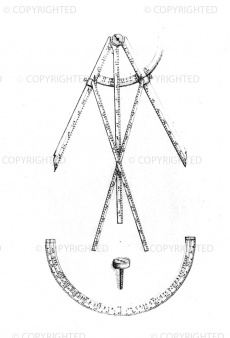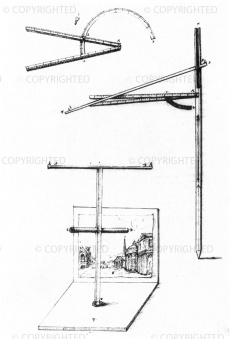Surveying Compasses
From Inventions
| (4 intermediate revisions not shown) | |||
| Line 1: | Line 1: | ||
{{Template invention | {{Template invention | ||
| - | |nome= | + | |nome= |
| + | Current name for a surveying instrument widely used in Renaissance times. | ||
|inventore= | |inventore= | ||
| - | |data= | + | |data= 16th-17th C. |
| - | |descrizione= | + | |descrizione= |
| + | Compass used for surveying, generally consisting of two flat graduated legs, a magnetic [[compass]] in the hinged joint and sighting devices. In its simplest form, this type of compass is well represented by the so-called [[Florentine Archimeter | florentine archimeter]]. In a version described by Giacomo Contarini, which may have been invented by Fabrizio Mordente, the instrument has two graduated legs with a magnetic compass in the joint, a graduated arm also pivoted at the joint, two small graduated arms connected to cursors sliding along the legs, and a 180° graduated arc. | ||
|componenti= | |componenti= | ||
| Line 15: | Line 17: | ||
|strumentiesistenti= | |strumentiesistenti= | ||
| - | [http:// | + | - Museo Galileo, Institute and Museum of the History of Science, Florence <br> |
| + | [http://catalogue.museogalileo.it/object/TriangulationCompass.html Florence, Museo Galileo. Istituto e Museo di Storia della Scienza, Inv. 645.]<br> | ||
| + | [http://catalogue.museogalileo.it/object/SurveyingCompass_n06.html Florence, Museo Galileo. Istituto e Museo di Storia della Scienza, Inv. 1280.]<br> | ||
| + | [http://catalogue.museogalileo.it/object/SurveyingCompass_n05.html Florence, Museo Galileo. Istituto e Museo di Storia della Scienza, Inv. 1471.]<br> | ||
| + | [http://catalogue.museogalileo.it/object/SurveyingCompass_n04.html Florence, Museo Galileo. Istituto e Museo di Storia della Scienza, Inv. 3687.]<br> | ||
| + | [http://catalogue.museogalileo.it/object/SurveyingCompass_n07.html Florence, Museo Galileo. Istituto e Museo di Storia della Scienza, Inv. 2527.]<br> | ||
|link= | |link= | ||
| - | |immagini= | + | |immagini= |
| - | Image: | + | <gallery widths=230 heights=368 perrow=3> |
| + | |||
| + | Image: 56700.jpg | Giacomo Contarini. ''Figure d'Istromenti Matematici'', Oxford, c. 1590, c25.<br /> | ||
| + | |||
| + | Image: 56701.jpg | Giacomo Contarini. ''Figure d'Istromenti Matematici'', Oxford, c. 1590, c39.<br /> | ||
| + | |||
| + | </gallery> | ||
| - | |||
| - | |||
|autore_scheda= Filippo Camerota | |autore_scheda= Filippo Camerota | ||
Current revision as of 08:21, 10 September 2010
Current name for a surveying instrument widely used in Renaissance times.
Contents |
Historic Period
16th-17th C.
Description
Compass used for surveying, generally consisting of two flat graduated legs, a magnetic compass in the hinged joint and sighting devices. In its simplest form, this type of compass is well represented by the so-called florentine archimeter. In a version described by Giacomo Contarini, which may have been invented by Fabrizio Mordente, the instrument has two graduated legs with a magnetic compass in the joint, a graduated arm also pivoted at the joint, two small graduated arms connected to cursors sliding along the legs, and a 180° graduated arc.
Bibliographical Resources
Contarini, Giacomo. Figure d'Istromenti Matematici e loro uso, ms, ca. 1590, Oxford, Bodleian Library, Ms. Canon. Ital. 145.
Existing Instruments
- Museo Galileo, Institute and Museum of the History of Science, Florence
Florence, Museo Galileo. Istituto e Museo di Storia della Scienza, Inv. 645.
Florence, Museo Galileo. Istituto e Museo di Storia della Scienza, Inv. 1280.
Florence, Museo Galileo. Istituto e Museo di Storia della Scienza, Inv. 1471.
Florence, Museo Galileo. Istituto e Museo di Storia della Scienza, Inv. 3687.
Florence, Museo Galileo. Istituto e Museo di Storia della Scienza, Inv. 2527.
Images
Author of the entry: Filippo Camerota


